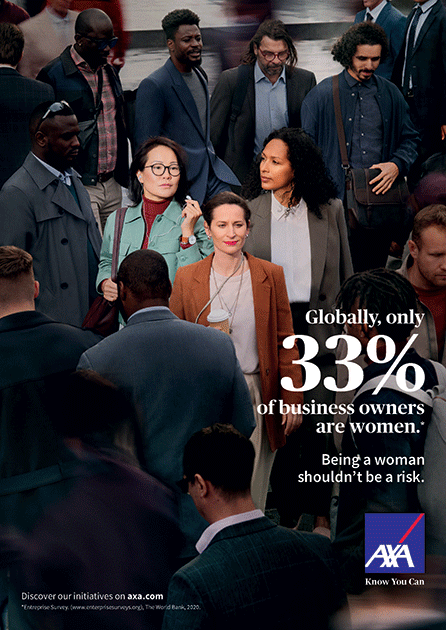“We had to tackle topics like unconscious bias and domestic violence without losing the tone we wanted, which is hopeful, optimistic and gives everyone energy,” she added.
Taking action
As brand campaigns about gender equality tend to be closely scrutinized, AXA insists that its marketing is backed up with concrete action throughout its business.
For example, in health, it has developed products specifically geared at women’s issues, such as coverage for breast cancer patients and free teleconsultation services to provide medical attention digitally. In sports, it sponsors women’s teams Liverpool Women’s FC in the U.K. and the AXA Women’s Super League, Switzerland’s main women’s soccer league. Since female entrepreneurs tend to have less access to funding, AXA has advisors who support female business leaders and offers customized coverage for small businesses.

As of 2024, AXA will also introduce a domestic abuse policy and support hub, offering up to five days of paid leave for employees who are experiencing domestic abuse to make arrangements.
It’s an uncertain environment, but it shouldn’t lead us to be fatalistic and paralyzed.
Ulrike Decoene
Internally, AXA said it is addressing gender parity through initiatives such as inclusive recruitment guidelines and leadership training for women. Across the global group, 41% of its CEOs are women–including newly appointed U.K. and Ireland CEO Tara Foley–and 41% of its group leadership network (GLN, comprising its top 250 executives) are women. It claims it has closed the unjustified pay gaps among the GLN. In 2017 it also launched a global parental leave policy, offering the primary parent fully paid leave of 16 weeks and the co-parent paid leave of four weeks.
Its campaign came about because “we also wanted to bring [these efforts towards gender equality] to women outside of the company–our customers,” said Decoene. “This is a call to action that goes well beyond our clients and employees.”
Changing an image
AXA’s message is just as much aimed at the industry it operates in. The financial services sector is known for being male-dominated.
Though Decoene said “there has been massive progress in recent years” in closing the industry’s gender gap, there is still work to be done in attracting more women to the field.
“The future of gender equality in financial services will depend on training choices starting early on. How do we get more women interested in the sector as a start?” she said. “Hopefully, our campaign’s message can help give a different image of what insurance companies could think about, or maybe inspire more women to join the sector.”

